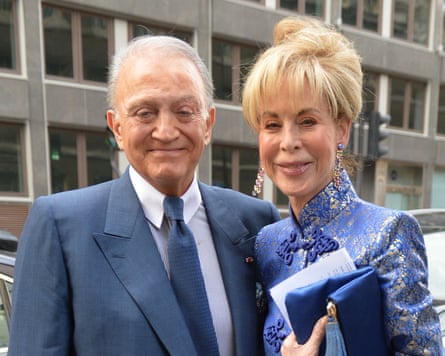The Conservative party is facing questions over a possible breach of electoral law involving one of its largest benefactors, after leaked files cast doubt on official declarations of donations worth £2.6m.
More than 40 donations to the Tories over 23 years have been registered in the name of Rosemary Saïd, a British woman.
But leaked documents marked “official – sensitive” renew long-running questions about whether it is her husband, the billionaire businessman Wafic Saïd, who is the real source of the money even though he is barred by electoral law from donating.
One of the documents, an official government log from Boris Johnson’s time in Downing Street, contains the entry: “Political meeting with Wafic Said (donor) and Rosemary Said.”
Wafic also had two separate phone calls with Johnson and senior aides without his wife, according to other logs.
A Canadian citizen resident in Monaco, Wafic, 85, is barred by law from donating because he is not eligible to vote in the UK. Rosemary, 79, is allowed to give money and the Conservative party has declared donations in her name between 2001 and 2024. Johnson declared a £10,000 contribution from her during his leadership campaign.
When contacted for comment, Wafic Saïd said: “My wife is an independently wealthy woman who has been a strong supporter of the Conservative party her entire life.”
He added: “I have not made donations to the Conservative party for at least 25 years, and any suggestion otherwise would be clearly untrue and would be a very serious matter for me, as I always respect the law.”
A Conservative party spokesperson said it carried out “proper due diligence” on the donations and added: “We do not comment on purported leaked documents, which may have been obtained or manipulated by hostile states.”
The files were obtained by Distributed Denial of Secrets (DDoS), a US-registered non-profit that archives leaked and hacked documents. DDoS has said it does not know the provenance of the data. The Guardian has seen no evidence that the files have been doctored.
Rise to prominence
Born in Damascus, Wafic came to Britain in the 1960s and ran a restaurant in west London. He rose to prominence as a fixer for Saudi royals, playing a role in arms sales from the UK to the kingdom.
He gave money – reportedly £300,000 – to the Tories in the 1990s but stopped after scandals over foreign donations led to them being banned. From 2001, the Conservatives began to declare donations in Rosemary’s name.

The leaked file showing that it was Wafic – rather than Rosemary – who was described as a donor appears in a trove of documents from Boris Johnson’s private office obtained by DDoS and seen by the Guardian.
The documents contain logs recorded by civil servants that keep a minute-by-minute record of the prime minister’s activities.
The entry identifying Wafic as the donor was made on 12 September 2019, over a month into Johnson’s premiership. It says he and two top aides spent an hour and a half with the Saïds.
Although the log entry is not a formal statement of a donor’s identity, other records show Wafic enjoyed the kind of privileged access to a prime minister typically granted to donors, rather than merely a donor’s spouse.
In June 2020, as the Covid pandemic raged, Johnson found half an hour for what the official log records as “political phone calls”, meaning Tory party matters rather than affairs of state. He was joined by Ben Elliot, the fellow Old Etonian whom Johnson had appointed party chair to turbocharge fundraising, on a call to Wafic. It appears to have been followed by a call with a major donor.
In March 2021, on a train journey from Stoke-on-Trent to London, Johnson made a quick call to another donor and then phoned Wafic again.
Other “political” meetings and phone calls recorded in the logs were between Johnson and Conservative party donors, ministers, staff or advisers.
There is no record of Rosemary being on the calls with Wafic and she is not named in the logs, which cover all but two months of Johnson’s time in No 10, apart from on the Downing Street meeting she attended with Wafic.
Wafic said: “At my age, I do not recall these conversations. However, it is entirely possible that he [Johnson] may have called to thank me for my contribution to Covid vaccine research.” In 2020, Wafic gave £3m to the University of Oxford to fund that work.
Steve Goodrich, the head of research at Transparency International UK and a former Electoral Commission senior policy adviser, said “credible allegations of rule breaking” should be investigated.
“Electoral law is crystal clear that parties and politicians can only accept donations from permissible sources, and recipients must verify the source of funds,” he said.
The Conservative party spokesperson said it “only accepts permissible donors as set out in law. Proper due diligence was undertaken to ensure that these donations were permissible and accurately reported. Other individuals can support a political party without being a donor.”
Wafic also said he had known Johnson since “long before he became prime minister”.
Approached for comment, Johnson did not respond to specific questions about the donations. He likened the Guardian’s coverage of the leaked files to Soviet propaganda.
‘True friend and admirer’
The files also contain a copy of a letter Wafic wrote to Johnson when he resigned as prime minister. He said it had been “emotional” watching Johnson’s final speech from the dispatch box and he commended him on a “legacy to be proud of”.
“I really enjoyed all the meetings we had, whether in person or via Zoom,” Wafic went on. “I hope that now you are free of the burdens of high office, we will be able to see you more often. I also hope that you realise that in me you have a true friend and admirer. Rosemary joins me in sending you and all your family our warmest wishes and fond affection.”
Johnson replied: “I am proud of my time in office although there is of course much more I would have liked to achieve given the opportunity. I am grateful for your ongoing support and friendship.” He added: “Please send my best to Rosemary, and I look forward to seeing you soon.”
Contact us about this story
Show
The best public interest journalism relies on first-hand accounts from people in the know.
If you have something to share on this subject you can contact us confidentially using the following methods.
Secure Messaging in the Guardian app
The Guardian app has a tool to send tips about stories. Messages are end to end encrypted and concealed within the routine activity that every Guardian mobile app performs. This prevents an observer from knowing that you are communicating with us at all, let alone what is being said.
If you don't already have the Guardian app, download it (iOS/Android) and go to the menu. Select ‘Secure Messaging’.
SecureDrop, instant messengers, email, telephone and post
If you can safely use the tor network without being observed or monitored you can send messages and documents to the Guardian via our SecureDrop platform.
Finally, our guide at theguardian.com/tips lists several ways to contact us securely, and discusses the pros and cons of each.
Illustration: Guardian Design / Rich Cousins

 1 month ago
44
1 month ago
44

















































